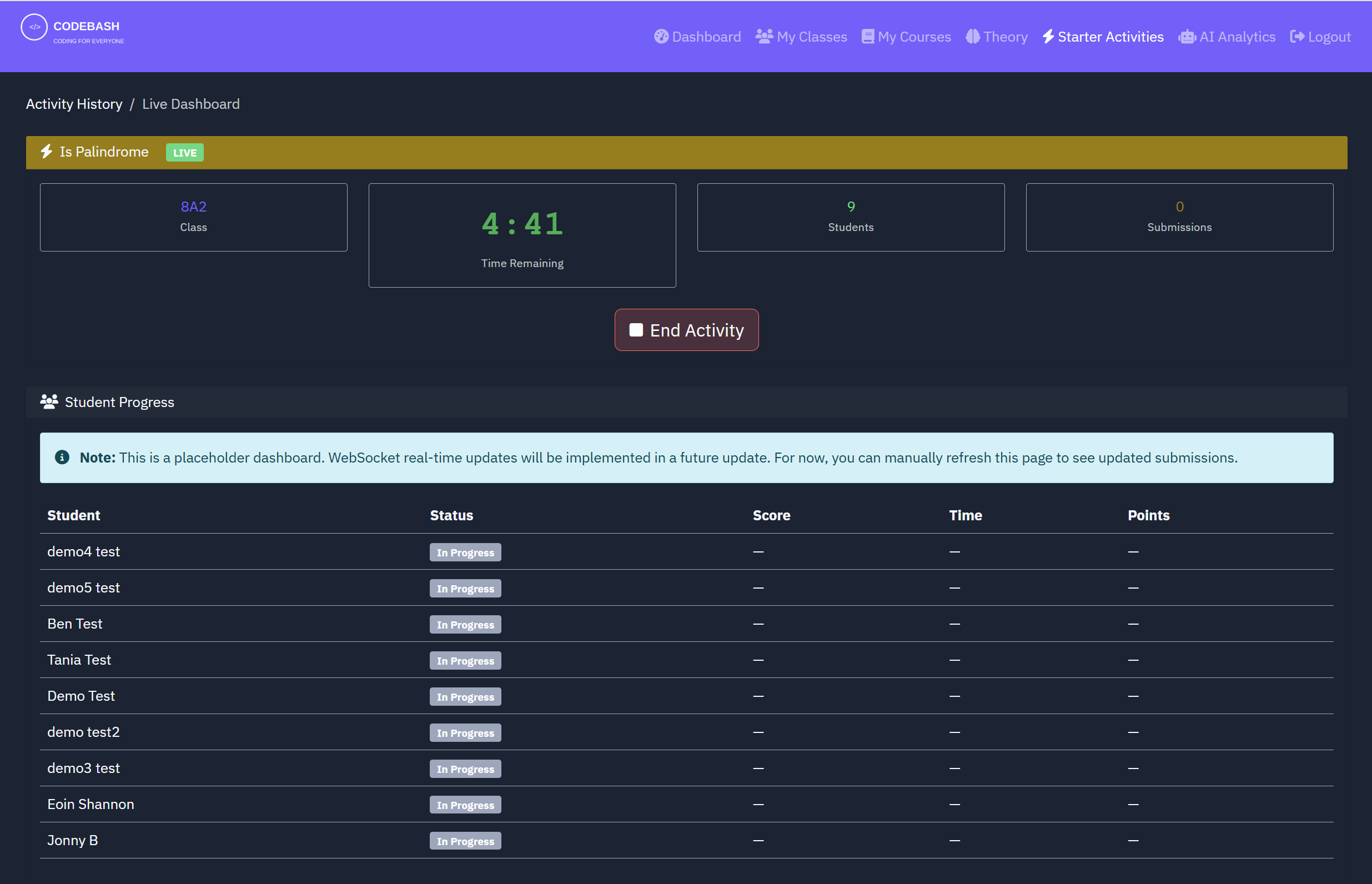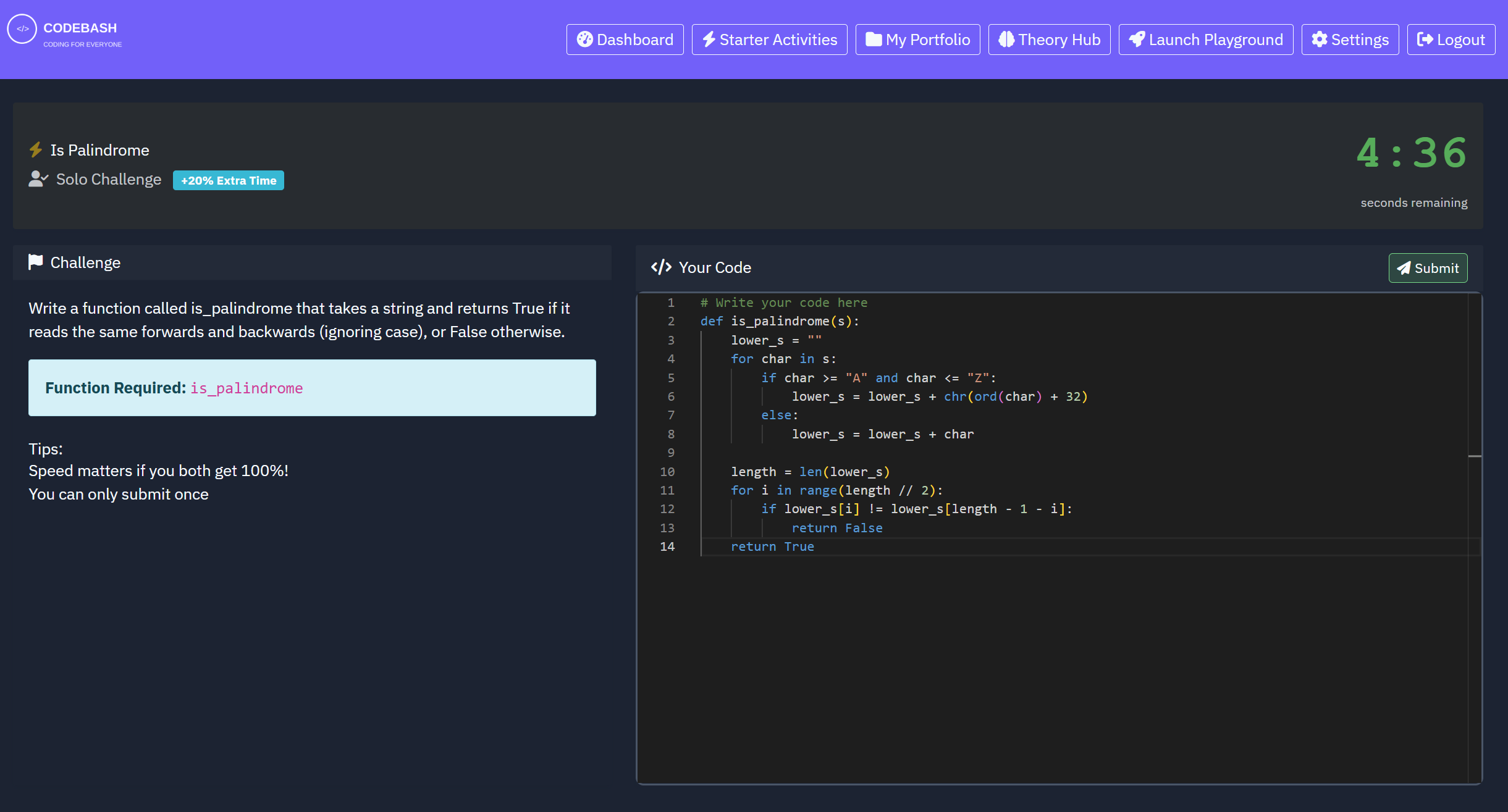22 November 2025
Starter Activities - Solving the "First 10 Minutes" Problem with Competitive Coding



Every CS teacher knows the struggle: students arrive at different times, some finish warm-ups in 2 minutes while others need 10, and by the time everyone's ready, you've lost precious teaching time. Meanwhile, your faster students are bored, your SEN students feel rushed, and engagement flatlines before the lesson even begins.
I built Starter Activities in CodeBash to solve exactly this problem - and it's transformed how my classes start.
Think competitive coding warm-ups - short, focused challenges (2-10 minutes) where students face off in 1v1 coding battles. But here's where it gets interesting: the system uses a round-robin pairing algorithm that ensures:
- Every student faces every other student exactly once before any repeat matchups occur
- Once all possible pairings are complete, the system resets and begins a fresh cycle
- Fair, systematic competition with no manual intervention needed
No manual pairing. No awkward "find a partner" moments. Just automatic, fair matchups that cycle through your entire class.
Students arrive and immediately see their active challenge. The system automatically pairs them for their next scheduled matchup. Early arrivals compete first, latecomers join as they arrive. No one waits idle.
Here's the clever bit: teachers can assign extra time per student (10-50% more) for SEN or EAL learners. But the scoring system normalises times - a student with 30% extra time who completes in 8 minutes is scored as if they completed in ~6.15 minutes relative to their opponent.
This means SEN students compete fairly without anyone knowing who has accommodations. It's invisible to students but visible to you in the admin panel.
Two leaderboards drive engagement:
- Class leaderboard: Who's the coding champion in Year 10?
- Global leaderboard: How does your class rank against other schools?
Students see wins, losses, win rates, perfect scores, and fastest completion times. Suddenly, that "boring warm-up" becomes something they actually care about.
The perennial problem: "I'm done, what now?" is solved elegantly. Students who complete their challenge early gain access to:
- Exemplar solutions showing efficient, well-structured approaches to similar problems
- Curated links to external resources for deeper exploration (Python documentation, algorithm visualisers, practice platforms)
- Extension reading tailored to the challenge topic
This keeps fast workers productively engaged whilst others finish, and encourages independent learning beyond the classroom. No more "Can I go on CoolMathsGames?" requests.
The scoring system rewards both correctness and efficiency:
- Both students score 100%: Base points (3pts), but the faster student gets a speed bonus (+2pts = 5pts total)
- Partial credit (50-99%): 1pt
- Failure (<50%): 0pts
This discourages "spam submissions until it works" behaviour. You need to think, code cleanly, and execute efficiently - exactly what exams require.
The algorithm systematically cycles through your entire class:
- In the first cycle, Student A faces Students B, C, D, E... until they've competed against everyone
- Student B faces Students C, D, E, F... (excluding A, who they've already faced)
- This continues until every possible pairing has occurred exactly once
- Once the cycle completes, the system resets and begins fresh matchups
Result? Even in a class of 20, you get 190 unique pairings before any student faces the same opponent twice. Perfect for term-long engagement without repetitive competition.
- Timed pressure: Mirrors exam conditions
- No external resources: Closed environment (no Google, no ChatGPT)
- Algorithmic thinking: Challenges require problem decomposition, not memorisation
- Instant feedback: Auto-grading shows exactly where code failed
- Pattern recognition: Regular exposure to common algorithm patterns (FizzBuzz, string manipulation, list operations)
I run these every lesson. By exam season, students are comfortable coding under time pressure with no safety net.
Since implementing this:
- Attendance-punctuality correlation: Students actually arrive on time to compete
- SEN confidence: Students who usually avoid coding are participating (and winning sometimes!)
- Cross-curricular benefits: The algorithmic thinking transfers to maths problem-solving
- Independent learning: Students are voluntarily exploring resources beyond the set challenge
"I used to have 5-6 students trickling in late. Since we started doing Starter Activities, I've had perfect punctuality for three weeks straight. They don't want to miss the pairing announcement or lose out on time."
www.codebash.co.uk


Discussion
Please login to post a comment
Looks lovely but very pricey?